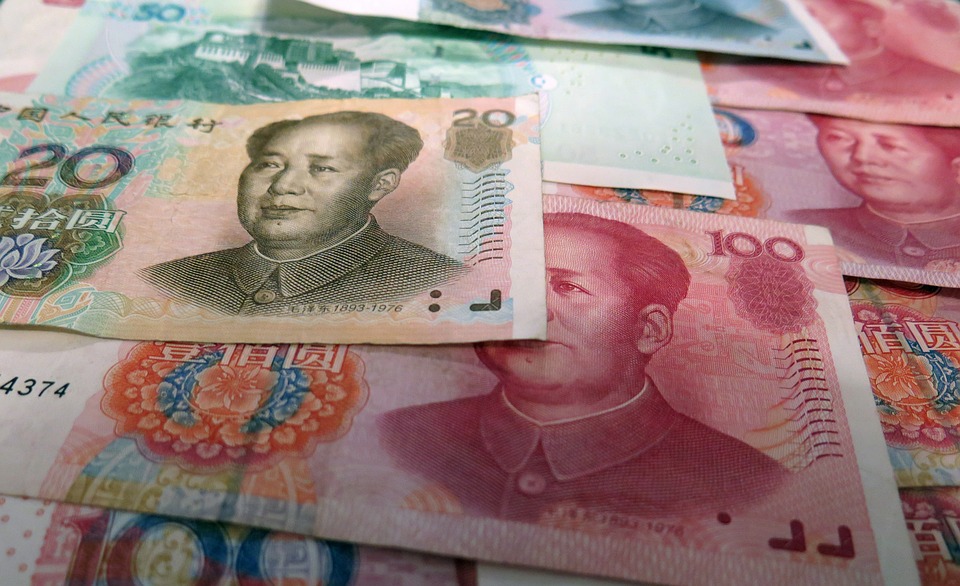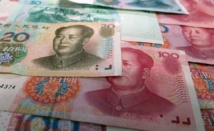Chinese banks are rapidly increasing their lending to non-bank financial institutions. This trend may become a "black swan" (a term meaning rare and difficult to predict events that have a significant impact) for the Chinese economy. This opinion was expressed in the note of Royal Bank of Scotland.
According to the British bank’s classification, the non-bank category includes financial institutions such as brokerage firms, asset management companies and loan sharks. The Chinese law forbids them to accept money for deposits.
Royal Bank of Scotland said that lending to non-bank institutions is the "most important factor in the overall credit growth" in China.
Moody's Investors Service estimated that total amount of the Chinese shadow banking sector recently increased to 45 trillion yuan ($ 6.92 trillion), accounting for nearly two-thirds of the Chinese economy.
At the same time, Bloomberg notes that volume of investments in the financial management products increased by 70% in 2015, to 18.8 trillion yuan ($ 2.9 trillion), which is far ahead of other assets held in trust (financial management products are one of the most popular tools used in the shadow banking; produced by trust funds and brokerage houses in cooperation with the banks for selling to the population).
Lending to non-bank financial institutions is largely obliged to an extensive black market of banking services in China.
The country has a very strict regulation of bank lending, and many companies are facing difficulties in raising funds to projects. Most often, the non-bank financial institutions services are in demand among private individuals and small businesses. Though interest rates on such loans are higher than in the large commercial banks - more than 10% with the standard of 4% - yet more accessible.
Influence of the shadow financial sector on the Chinese economy is quite noticeable. For example, in a note published earlier this year, the research team of the Chinese branch of HSBC suggested that the rapid rise in house prices in Chinese cities of Shenzhen and Shanghai was largely triggered by growth of the shadow banking sector.
The sharp rise of such lending firms carries a risk of "abrupt turn", similar to that observed in mid-2013, says Royal Bank of Scotland.
Then one of the largest economies in the world found itself amid a liquidity crisis. This led to a spike in interest rates on interbank loans: they had risen from the usual 2-3 to a record 14%.
The Chinese authorities have already made attempts to stop the rapid growth of the informal lending, which is hard to manage and assess accurately.
At the end of 2015, China Banking Regulatory Commission announced introduction of stringent restrictions on P2P-lenders (loan sharks), who numbered several thousand in China. They were forbidden to accept deposits from individuals and attract funds from investors.
In April, the Chinese edition of Caixin reported that from 14 April, financial institutions must not only register at the state administration for industry and commerce, but also get permission of financial regulators. The new rules apply to just those non-bank financial institutions, which loans increased significantly in the last year - management companies, online financial companies, lenders, P2P networks.
Inflating the credit bubble is fraught with growth of risky assets. Sooner or later, they are deemed to fall on the Chinese banks’ shoulders.
"If you talk to the banks, they will say that it is someone else's credit risk, - said Matthew Smith, a financial analyst at Macquarie Group, in conversation with Bloomberg. - But the credit risk does not disappear. Ultimately, the credit risk will be owned by banks. If something goes bad, brokers do not have the necessary balance to cope with this risk, so someone will have to come in and take it on himself. "
The Chinese economy is already sending warning signals. According to official data, volume of non-performing loans in China's commercial banks jumped by 51% to 1.27 trillion yuan at the end of 2015. This is the worst result in the past ten years.
According to CLSA brokerage company, volume of overdue loans in the informal banking sector is estimated at 4.6 trillion yuan ($ 730 billion).
The potential size of the loss can amount to $ 440 billion. At the same time, according to a leading strategist of CLSA Francis Cheung, number of shadow overdue loans continues to increase and could grow from the current 15% to 25% of total loans in this segment.
The losses will have a significant impact on China's economy, commented a representative of Commerzbank’s Singapore branch. According to him, the drop in shadow lending could start a chain reaction in the whole banking sector in China.
source: bloomberg.com, ft.com
According to the British bank’s classification, the non-bank category includes financial institutions such as brokerage firms, asset management companies and loan sharks. The Chinese law forbids them to accept money for deposits.
Royal Bank of Scotland said that lending to non-bank institutions is the "most important factor in the overall credit growth" in China.
Moody's Investors Service estimated that total amount of the Chinese shadow banking sector recently increased to 45 trillion yuan ($ 6.92 trillion), accounting for nearly two-thirds of the Chinese economy.
At the same time, Bloomberg notes that volume of investments in the financial management products increased by 70% in 2015, to 18.8 trillion yuan ($ 2.9 trillion), which is far ahead of other assets held in trust (financial management products are one of the most popular tools used in the shadow banking; produced by trust funds and brokerage houses in cooperation with the banks for selling to the population).
Lending to non-bank financial institutions is largely obliged to an extensive black market of banking services in China.
The country has a very strict regulation of bank lending, and many companies are facing difficulties in raising funds to projects. Most often, the non-bank financial institutions services are in demand among private individuals and small businesses. Though interest rates on such loans are higher than in the large commercial banks - more than 10% with the standard of 4% - yet more accessible.
Influence of the shadow financial sector on the Chinese economy is quite noticeable. For example, in a note published earlier this year, the research team of the Chinese branch of HSBC suggested that the rapid rise in house prices in Chinese cities of Shenzhen and Shanghai was largely triggered by growth of the shadow banking sector.
The sharp rise of such lending firms carries a risk of "abrupt turn", similar to that observed in mid-2013, says Royal Bank of Scotland.
Then one of the largest economies in the world found itself amid a liquidity crisis. This led to a spike in interest rates on interbank loans: they had risen from the usual 2-3 to a record 14%.
The Chinese authorities have already made attempts to stop the rapid growth of the informal lending, which is hard to manage and assess accurately.
At the end of 2015, China Banking Regulatory Commission announced introduction of stringent restrictions on P2P-lenders (loan sharks), who numbered several thousand in China. They were forbidden to accept deposits from individuals and attract funds from investors.
In April, the Chinese edition of Caixin reported that from 14 April, financial institutions must not only register at the state administration for industry and commerce, but also get permission of financial regulators. The new rules apply to just those non-bank financial institutions, which loans increased significantly in the last year - management companies, online financial companies, lenders, P2P networks.
Inflating the credit bubble is fraught with growth of risky assets. Sooner or later, they are deemed to fall on the Chinese banks’ shoulders.
"If you talk to the banks, they will say that it is someone else's credit risk, - said Matthew Smith, a financial analyst at Macquarie Group, in conversation with Bloomberg. - But the credit risk does not disappear. Ultimately, the credit risk will be owned by banks. If something goes bad, brokers do not have the necessary balance to cope with this risk, so someone will have to come in and take it on himself. "
The Chinese economy is already sending warning signals. According to official data, volume of non-performing loans in China's commercial banks jumped by 51% to 1.27 trillion yuan at the end of 2015. This is the worst result in the past ten years.
According to CLSA brokerage company, volume of overdue loans in the informal banking sector is estimated at 4.6 trillion yuan ($ 730 billion).
The potential size of the loss can amount to $ 440 billion. At the same time, according to a leading strategist of CLSA Francis Cheung, number of shadow overdue loans continues to increase and could grow from the current 15% to 25% of total loans in this segment.
The losses will have a significant impact on China's economy, commented a representative of Commerzbank’s Singapore branch. According to him, the drop in shadow lending could start a chain reaction in the whole banking sector in China.
source: bloomberg.com, ft.com



















